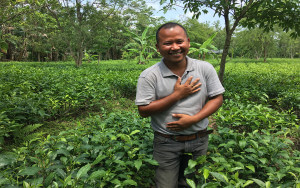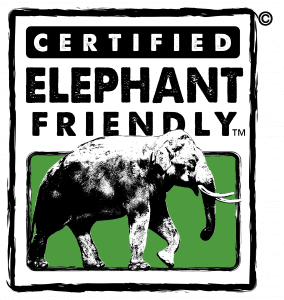Assam Gives to the World the First Elephant Friendly Tea Estate
 Shri Tenzing Bodosa’s tea estates located on 25 acres of farmland in Bodoland territorial area in two villages namely Kachibari and Khairani villages in the Udalguri district of Assam are farms with a difference. On a given day you can chance upon 70-80 wild elephants, hornbills, deer, peacocks and a variety of birds roaming amongst the tea bushes. Tea here is being grown by organic methods and it is inter-planted with trees. In times when animal – man conflict is pushing wildlife to the fringes and extermination of wild animals, Tenzing provides an alternative.
Shri Tenzing Bodosa’s tea estates located on 25 acres of farmland in Bodoland territorial area in two villages namely Kachibari and Khairani villages in the Udalguri district of Assam are farms with a difference. On a given day you can chance upon 70-80 wild elephants, hornbills, deer, peacocks and a variety of birds roaming amongst the tea bushes. Tea here is being grown by organic methods and it is inter-planted with trees. In times when animal – man conflict is pushing wildlife to the fringes and extermination of wild animals, Tenzing provides an alternative.
The two farms fall in an area where wild elephants and tea plantations compete for space. With tea eating into the Elephant’s habitat in northern part of Udalguri, Elephants tend to cross paths with humans occasionally with disastrous consequences. In Udalguri, in 2014-16, 52 people were killed by elephants while 14 elephants were killed in conflicts.

A lot of Assam’s tea plantations are in elephant habitats and corridors. Elephants don’t eat the tea leaves, but they often pass through or stop for rest in the estates during their long migrations. Electric fencing, deep drainage ditches, chemical pesticides, and fertilizers are hazards that the animals are forced to negotiate, sometimes unsuccessfully. Baby elephants are especially prone to falling into ditches. Adult elephants, which have a weakness for salt, sometimes end up poisoning themselves on fertilizers, which contain inorganic salts, and pesticides stored in tea estates.
Tenzing’s farms about the jungle. Tenzing has deliberately created a buffer at the edges of his farm, where he has planted bamboo trees for elephants to feed on. There is no fence and the wild elephants walk into the farmland unhindered.
Tenzing’s initiative comes from his intrinsic love for wildlife. He spent his childhood in the area and witnessed wildlife at close quarters. He dropped school after class 6 to help his mother take care of the ancestral farm. His father had died when Tenzing was just 6 years old. As time progressed, Tenzing joined a Malaysian construction company, which gave him exposure to the world- he learnt to drive, repair machinery, work on the internet and even speak English fluently. His exposure to the world gave him the confidence to take up challenges life tends to throw.
As his mother was getting older, Tenzing returned home and slowly gave shape to an initiative which to most be foolhardy. He started organic tea farming and made his farm wildlife friendly.
What makes the initiative unique is that Tenzing’s conservation approach has a business logic to it and therefore makes the initiative based on a value system, sustainable. Tenzing’s two tea estates are the first in the world to get certified as ‘elephant friendly tea’ by the Wildlife Friendly Enterprise Network and the University of Montana, US. This gets the tea from Tenzing’s estates a premium which is marketed under brand names of Bodo Black Assam Elephant Friendly and Bodo Green Assam Elephant Friendly tea.
Tenzing has a tea processing unit on the farm itself. A part of the premium which the consumers are ready to pay, the tea contributes towards a grant fund to support additional elephant conservation and human-elephant conflict reduction projects on the ground where the tea is grown.
The certification of elephant-friendly tea endorses that the tea meets high standards for the protection of elephant habitats and water resources, reducing human-elephant conflict, elimination of barriers to elephant movement between habitat areas, minimizes electrocution risks from fencing and power lines, reduces drainage ditch hazards and prevents the risk of poisoning of elephants.
We at Branolia congratulate Shri Tenzing Bodosa and the people of Assam for making a cup of tea contribute towards wildlife conservation. We at Branolia share this passion for making nature work for farmers and marginal forest dwellers by bringing in herbal therapeutics to the mainstream and ensuring a sustainable livelihood to the medicinal plant growers and gathers. We also hope that the trademarked ‘Elephant Friendly Tea’ market expands in India as well and obtains premium pricing and large tea plantation followed by the coffee plantations in southern India seek certification and brand themselves as ‘Elephant Friendly’.
[supsystic-social-sharing id="1"]
